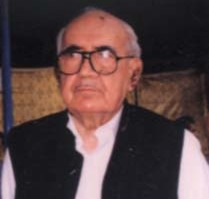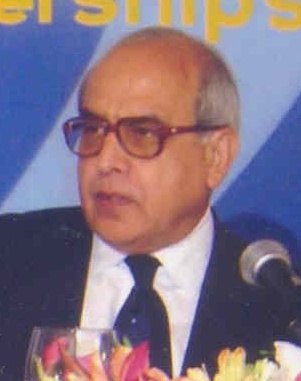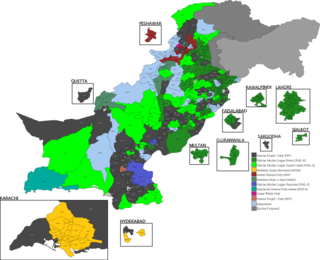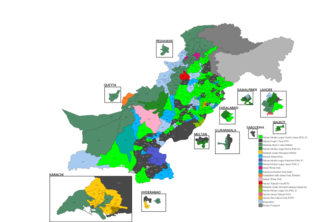
The Pakistan Muslim League (Nawaz) (Urdu: پاکستان مسلم لیگ (ن), abbr.PML(N) or PML-N) is a centre-right, conservative political party in Pakistan. It is currently the third-largest party in the Senate. The party was founded in 1993, when a number of prominent conservative politicians in the country joined hands after the dissolution of Islamic Democratic Alliance, under the leadership of former Prime Minister Nawaz Sharif. The party's platform is generally conservative, which involves supporting free markets, deregulation, lower taxes and private ownership. Although the party historically supported social conservatism, in recent years, the party's political ideology and platform has become more liberal on social and cultural issues; however, members have been accused of using Islamist populist rhetoric. Alongside the Pakistan Tehreek-e-Insaf (PTI) and Pakistan Peoples Party (PPP), it is one of the three major political parties of the country.

Ghulam Ishaq Khan, commonly known by his initials GIK, was a Pakistani bureaucrat, politician and statesman who served as the seventh president of Pakistan from 1988 to 1993. He previously served as Chairman of the Senate from 1985 to 1988 under president Muhammad Zia-ul-Haq, and was sworn in shortly after Zia's death.

Farooq Ahmad Khan Leghari, was a Pakistani politician who served as the eighth president of Pakistan from 14 November 1993 until resigning on 2 December 1997. He was the first Baloch to be elected as President.

Ghulam Mustafa Jatoi was a Pakistani politician who served as the Caretaker Prime Minister of Pakistan for three months, from 6 August 1990 to 6 November 1990. Ghulam Mustafa Jatoi's ancestors were Murids of the Pir's of Sarhandi.

Since its establishment in 1947, Pakistan has had a non-symmetric federal government and is a federal parliamentary democratic republic. At the national level, the people of Pakistan elect a bicameral legislature, the Parliament of Pakistan. The parliament consists of a lower house called the National Assembly, which is elected directly, and an upper house called the Senate, whose members are chosen by elected provincial legislators. The head of government, the Prime Minister, is elected by the majority members of the National Assembly and the head of state, the President, is elected by the Electoral College, which consists of both houses of Parliament together with the four provincial assemblies. In addition to the national parliament and the provincial assemblies, Pakistan also has more than five thousand elected local governments.

The Pakistan National Alliance, was a populist and consolidated right-wing political alliance, consisting of nine political parties of the country. Formed in 1977, the country's leading right-wing parties agreed upon to run a political campaign as a single bloc against the left oriented PPP in the 1977 general elections.
Anwar Saifullah Khan is a Pakistani politician and industrialist. As a member of the Pakistan Muslim League (Junejo), he served in Prime Minister Nawaz Sharif's cabinet as Federal Minister of Environment and Urban Affairs from 1990 to 1993 and as Federal Minister for Petroleum and Natural Resources from 1994 to 1996 in coalition with Prime Minister Benazir Bhutto.

Tehreek-e-Istiqlal was a political party in Pakistan. It was once the second most popular political party in Pakistan. It was formed by Air Marshal Retd. Asghar Khan in 1970.

General elections were held in Pakistan on 18 February 2008 to elect members of the 13th National Assembly and the four Provincial Assemblies.
Syed Munir Hussain Gilani is a Pakistani politician, who fought for democracy in Pakistan all his life. He has remained the Federal Minister for Education in the interim government of Prime Minister Balkh Sher Mazari.

The Islami Jamhoori Ittehad was a right-wing conservative alliance formed in September 1988 to oppose the democratic socialist Pakistan Peoples Party in elections that year. The alliance comprised nine parties, of which the major components were the Pakistan Muslim League (PML), National Peoples Party (NPP), Jamaat-e-Islami (JI), with PML accounting for 80% of the IJI's electoral candidates. The Inter-Services Intelligence (ISI) agency, under director Hamid Gul, had a major role in forming the right-of-centre political alliance. Care had been taken to ensure that the alliance comprised nine parties to generate comparison with the nine-party Pakistan National Alliance (PNA) that had campaigned against PPP in 1977.

General elections were held in Pakistan on 10 October 2002 to elect the 12th National Assembly and four Provincial Assemblies. The elections were held under the military government of Pervez Musharraf. The two mainstream parties, Pakistan Peoples Party (PPP) and Pakistan Muslim League (N) (PML-N) had several restrictions imposed on them and their leaders Benazir Bhutto and Nawaz Sharif were in exile. In order to address the restrictions, PPP created the Pakistan Peoples Party Parliamentarians (PPPP) under the leadership of Ameen Faheem, to contest the elections on its behalf. The PML-N meanwhile, suffering from the party's division into two factions: one that remained loyal to Sharif and were contesting the elections under the leadership of Javed Hashmi, and the other which had broken away to form the pro-Musharraf Pakistan Muslim League (Q) (PML-Q) under the leadership of Mian Muhammad Azhar. The emergence of the PML-Q marked the beginning of multi-party politics in the country, bringing an end to the decade-long two-party system between the PPP and PML-N.

The National People's Party (NPP) was a political party located in Pakistan. It was founded in 1986 by Ghulam Mustafa Jatoi after he had a disagreement with Benazir Bhutto, subsequently leaving the Pakistan Peoples Party.

General elections were held in Pakistan on 3 February 1997 to elect the members of National Assembly. The elections were a fierce contest between Pakistan Peoples Party (PPP) led by pre-election Prime Minister Benazir Bhutto and the Pakistan Muslim League (N) led by Nawaz Sharif. Unlike the 1990 elections where Sharif won due to allegations of rigging, this time he benefited from the controversial death of Bhutto's brother Murtaza, a populist leader, a worsening economy, and alleged corruption cases against Bhutto's husband Asif Ali Zardari.

General elections were held in Pakistan on 6 October 1993 to elect the members of National Assembly. The elections took place after both the Prime Minister Nawaz Sharif and President Ghulam Ishaq Khan resigned to resolve a power struggle.
The Mehrangate, also known as the Mehran bank scandal, was a major political scandal that took place in the Second administration of Prime Minister Benazir Bhutto in 1990.
Operation Midnight Jackal, or simply known as Midnight Jackal, was a first of two major political scandals that took place in the first term of Pakistani Prime Minister Benazir Bhutto in 1988–89 that was a plot of ISI's Internal Wing to assist the vote of no-confidence movement in the Parliament to pave the way for new elections in favor of conservative politicians.

General elections were held in Pakistan on 16 November 1988 to elect the members of the National Assembly and Senate.
Electoral fraud in Pakistan has a history intertwined with military interventions and legal obstacles against political dissenters, impacting the democratic process. Since its inception in 1947, Pakistan experienced alternating phases of democracy and authoritarianism, with the first general elections held only in 1970. The early governance was managed by a Constituent Assembly of Pakistan, tasked with both administrative functions and drafting a constitution.
















